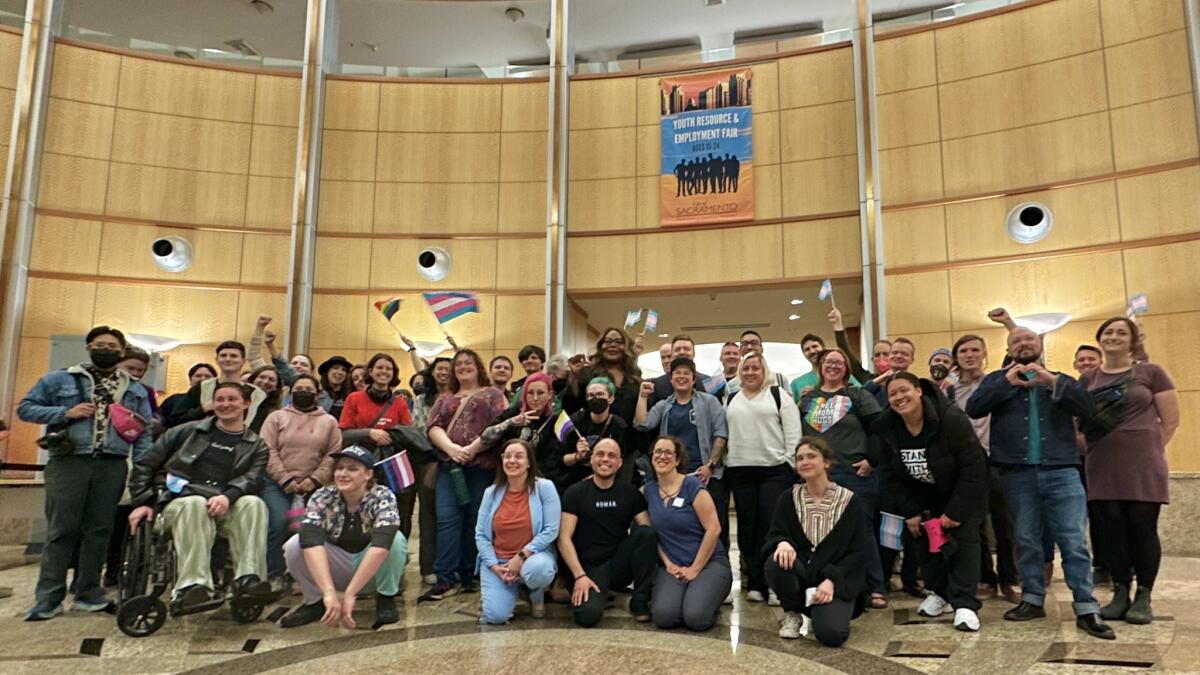Sacramento council votes unanimously to become a sanctuary city for transgender people

Sacramento’s City Council unanimously voted to declare the city a sanctuary for transgender people, joining a growing number of local governments that have adopted similar measures.
California itself became a sanctuary state in September 2022, when Gov. Gavin Newsom signed into law Senate Bill 107, which blocks attempts by other states to penalize families that come to California seeking treatment for transgender children or to avoid consequences for seeking such treatment elsewhere.
But council member Katie Valenzuela, who sponsored Sacramento’s resolution, said the measure will do more to make sure that city resources cannot be used to extradite transgender people and youth from other states who come to the city seeking gender-affirming care.
“We see this as a strengthening measure,” said Valenzuela. “This is more than just protecting the people who live here. This is also about protecting people who come here from other communities to ensure that we’re not aiding law enforcement activities in their home jurisdiction who may seek to criminalize their quest for healthcare.” City officials would face unspecified “corrective action” if found to be in violation of the resolution, she said.
“We debate the many issues in our city, but there’s no shade of gray when it comes to civil rights,” Sacramento Mayor Darrell Steinberg said prior to the vote. “And when it comes to talking about the human rights of people, our city is consistent and we’re strong.”
Emily Smet, an organizer with the Democratic Socialists of America who helped draft the resolution, said the language was adapted from immigration policies that cities established to limit cooperation with Immigration and Customs Enforcement.
“We can expect laws criminalizing out-of-state healthcare in the very near future. And in Sacramento, we want to be prepared for that, she said.
Passing a resolution is just one of the steps Sacramento needs to take to make itself a haven for transgender people, Smet contends. Through the socialist group’s mutual-aid efforts to address economic insecurity, she said she’s seen a disproportionate number of transgender people experiencing poverty and housing insecurity.
Eric Stanley, a professor at UC Berkeley’s Department of Gender and Women’s Studies, was not impressed by the resolution’s language, saying there was a disconnect between politicians’ virtue signaling and the experiences of transgender people. Stanley said it’s dangerous for politicians to present California as a “liberally safe space” that is welcoming to the transgender community without addressing these basic needs.
Stanley, who has studied the criminalization of queer and transgender communities, said part of the problem is that individuals arriving from other states assume that moving to California will provide them access to gender-affirming healthcare, unaware of how costly that care — and everything else — is here.
Living in one of the most expensive states in the country can exacerbate the housing discrimination that transgender people already face, he said. “Trans people are hyper-represented in houselessness,” said Stanley.
The resolution is “more or less a political stunt,” he said, because it assumes the people seeking gender-affirming care all have middle- or upper-middle-class incomes.
Locally, nonprofits like the Sacramento LGBTQ Community Center are trying to address the cost-of-living issue head on; they provide transitional housing for queer youth facing homelessness.
David Heitstuman, director of the center, said he’s excited about the resolution cementing the city’s inclusive reputation, but wants to see continued investment in basic services like housing.
“Even though we have a progressive policy on the books at a statutory level, we need to ensure that there is more ... access to services, access to care,” said Heitstuman. Younger generations of Americans are more likely to identify as queer, and the most recent numbers say 1 in 5 Gen Z adults identifies as LGBTQ.
“There’s certainly a mismatch between what the law says and what people are actually experiencing in the world, even here in California.”
The Human Rights Campaign has also tracked hate crimes against transgender people throughout the country since 2013, calling it an “epidemic” of fatal violence that disproportionately affects transgender women of color. And according to the State of Pride report published by the California Department of Justice in 2023, hate crimes against LGBTQ+ people jumped 29% between 2021 and 2022.
“I think that we need even more investments in supporting the LGBTQ community that’s disproportionately impacted by these issues,” said Heitstuman.
More to Read
Sign up for Essential California
The most important California stories and recommendations in your inbox every morning.
You may occasionally receive promotional content from the Los Angeles Times.











